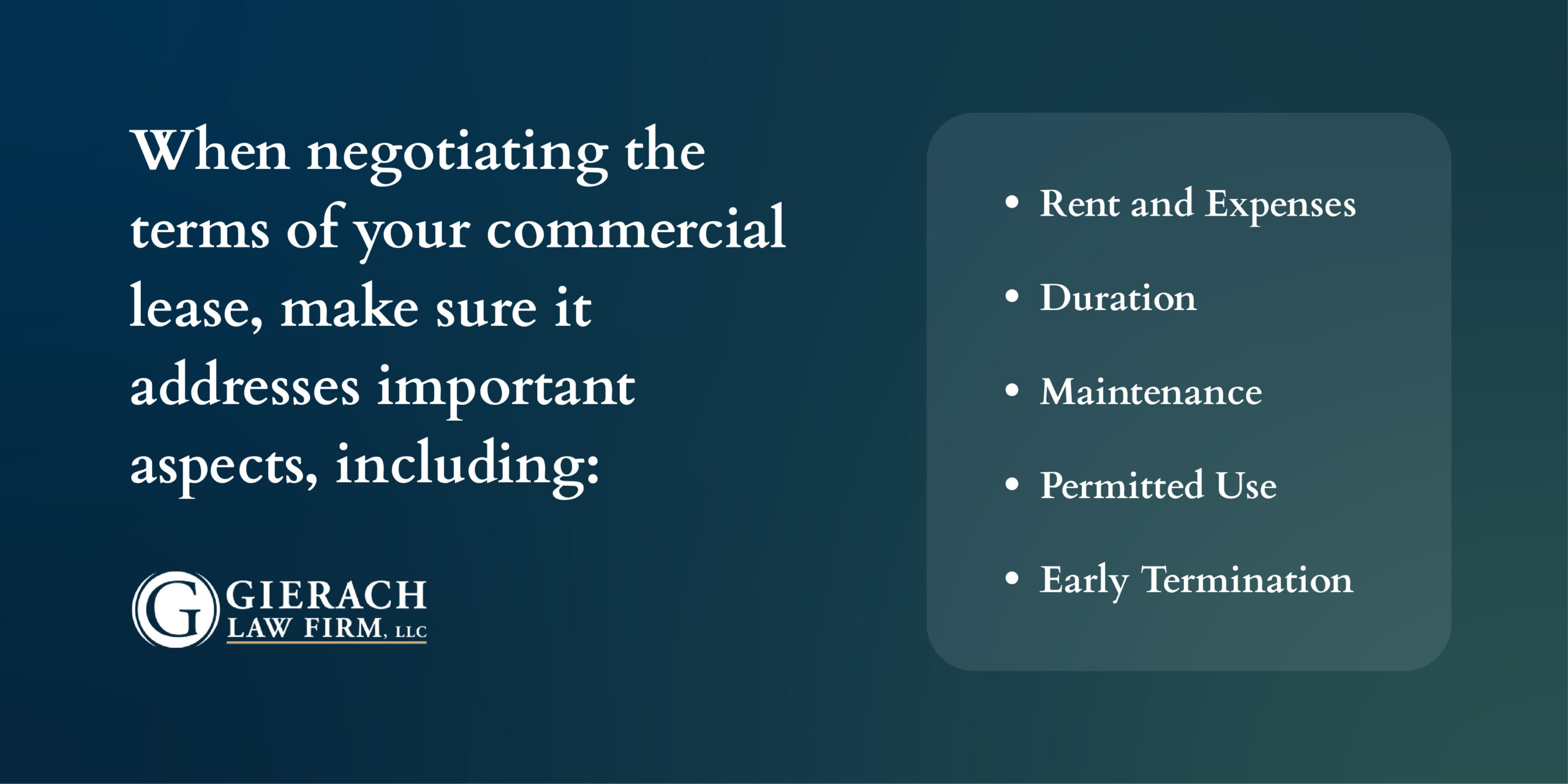What Do Illinois Businesses Need to Know Before Signing a Commercial Lease?

Commercial leases differ in significant ways from residential leases. For one, they tend to have a longer duration, and the monthly cost is generally much higher. Commercial leases also provide significant room for negotiation and flexibility. On the other hand, laws affecting commercial leases offer less protection for the commercial tenant than are generally available in a residential context. Because the contents of a commercial lease can help make or break a new business, business owners should carefully consider the provisions and negotiate the terms. An experienced Naperville, IL commercial real estate attorney can advise you on the important considerations for signing a commercial lease.
What are the Different Types of Commercial Leases?
There are different types of commercial leases based on the way rent payment is structured. Unlike residential leases, a commercial lease rent payment might be structured as some combination of a base rent plus other elements such as utilities, taxes, and even a percentage of profits. The availability of different commercial lease structures allows parties to negotiate an agreement that best benefits their commercial relationship. For example, a popular, proven business in an affluent area might not need the same type of terms as a new mom-and-pop shop in an up-and-coming neighborhood. Common commercial lease types in Illinois include:
Gross Lease or Full Service Lease
This type of commercial lease is closest in spirit to the residential lease. In the gross lease, the tenant pays a base rent and the landlord is responsible for all other charges such as utilities, taxes, and insurance. These leases tend to come at a higher cost as the landlord will shoulder all the additional fees.
Net Lease
Tenants in a net lease pay a base rent plus certain types of expenses such as taxes, maintenance, and insurance. In a single net lease, the commercial tenant will pay rent plus one expense. A double net lease tenant will pay rent plus two of the expense types, and a triple net tenant will pay all of the expenses plus rent.
Master Lease
In a master lease, a “master tenant” leases the property from the landlord and then subleases it to a number of other subtenants, like in a shopping mall. The master tenant will usually pay either a fixed rent or one based on a percentage of profits, as well as operating expenses. They will manage the property and collect rent from the subtenants.
Percentage Lease
Commonly used in the retail space, commercial tenants with a percentage lease will pay a fixed base rent plus a percentage of profits, allowing for a lower base rental amount in cases where the tenant is successful.
Sale and Leaseback Agreement
In this type of lease, the commercial property owner will sell the property and then lease it from the new landlord/owner.
What are Critical Aspects to Include In Your Commercial Lease Agreement?
Rent and Expenses
Given the many different types of leases (and types of expenses) available to Illinois tenants and landlords, it is important to understand how your commercial lease will be structured. For example, will you have to pay a base rent plus a percentage of revenue as in a percentage lease? Or does your landlord pay all expenses but expect you to pay a higher base rent? Make sure you consider whether the type of lease structure the landlord offers is right for your business. It is also recommended to speak to the landlord and request data about the typical cost of expenses before signing the lease, if you are responsible for those expenses.
Duration
In addition to specifying the length of the lease, this section should lay out whether you have an option to extend the lease, how long you have to exercise that option, and whether the option is offered at a specific price.
Maintenance
The commercial agreement should specify who is responsible for maintenance and repair expenses for the space and anything included within it. For example, the lease should outline who is responsible for repairs to the air conditioning system. If there is landscaping outside, it should provide information on who will pay for its upkeep.
Tenant Improvements
Usually, commercial spaces require a great deal of tenant improvements. Whether you are turning a space that was a restaurant into a retail store, an office into a restaurant, or simply redecorating, you will most likely have to spend money and time on improvements. Your commercial lease should detail who will pay for these, and the state the space should be in when the tenant returns it at the end of the lease. Does the tenant need to remove only fixtures, or return the space empty of any improvements?
Permitted Use
Be sure to read any section that outlines the tenant’s permitted use of the premises carefully. You want to ensure that the permitted use does not conflict with your business plan. This section can get pretty detailed, outlining any fixtures you may add, any signage details, things you may not sell on the premises, and so on.
Early Termination and Default
What happens if you have to terminate the lease early due to an unforeseen situation? Are there penalties that you must pay to vacate the space before the lease term ends? Ensure that the early termination and default clause provides you with some flexibility in the event things do not work out and it is no longer commercially feasible to lease the space.
Assignment and Subleasing
This section should outline whether you are able to assign or sublease the space, and the requirements for doing so. Are you able to bring in another commercial tenant to take over the lease in order to mitigate the loss if you have to leave the space? This section is vital not only if the business goes south, but also if you succeed and want to relocate or need space to grow. You will not want to be stuck with a lease that does not allow you to assign or sublease the space under certain conditions.
Parking Space
Depending on your business and its location, you will need parking spaces for customers and staff. Make sure that your lease provides for the number of parking spaces you need for your business to thrive.

Call a Naperville, IL Commercial Real Estate Attorney
If you are seeking a commercial space to rent, an experienced Naperville, IL commercial real estate attorney can help you draft and negotiate your commercial lease agreement. At the Gierach Law Firm, attorney Denise Gierach can represent you and ensure that your rights are preserved in the final lease agreement. Call the office at 630-756-1160 to schedule a consultation.
Practice Areas
Archive
+2018
+2016
Please note: These blogs have been created over a period of time and laws and information can change. For the most current information on a topic you are interested in please seek proper legal counsel.














